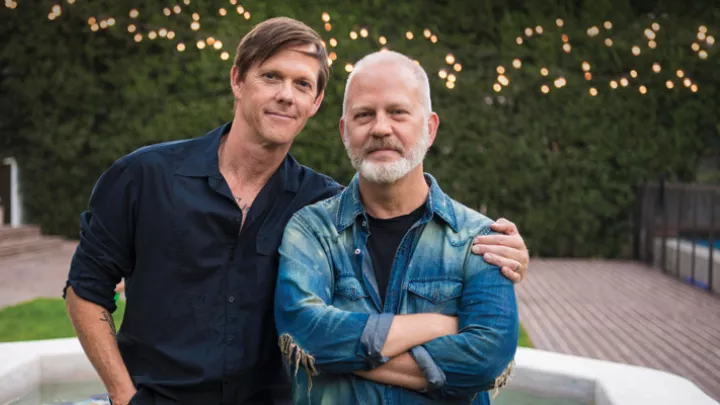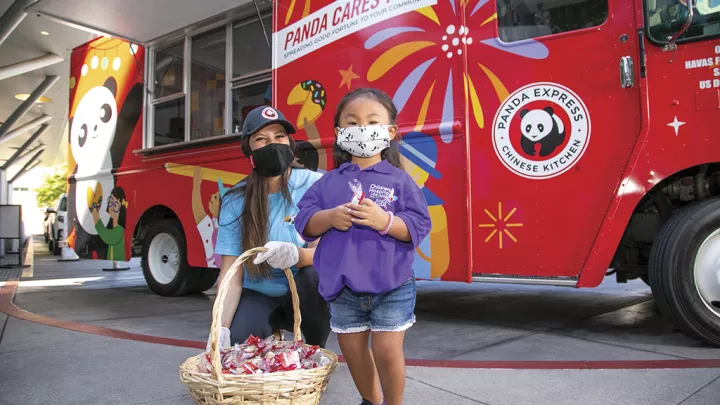
To Dad, With Love
There are the kinds of dads who read their young daughters fairy tales and “Goodnight Moon.” And then there are other fathers, like Bram Bernstein, MD, who choose different books to share: medical textbooks.
“In the evenings, he used to read me his medical books and show me the pictures and explain everything,” remembers his daughter, Kirith Prady. “And I loved it.”
Those unconventional story times were just one of Prady’s early glimpses into her father’s world as a pediatric rheumatologist at Children’s Hospital Los Angeles. A more revealing look would come at the hospital’s holiday parties—where she met many of the children he cared for.
“They would always tell me how lucky I was to have Dr. Bernstein as my father,” she says. “I remember thinking he was taking very good care of them because they liked him so much.”
Dr. Bernstein retired in 2005, but over the years, Prady began thinking about how to honor her father’s work at Children’s Hospital Los Angeles. In 2020, she did so in a huge way—making a $3 million gift to the hospital to establish the Bram Bernstein, MD, Chair in Pediatric Rheumatology.
The inaugural chairholder is a physician Dr. Bernstein recruited and mentored— Katherine (Karen) Marzan, MD, now Chief of the Division of Pediatric Rheumatology. The endowment will support Dr. Bernstein’s longtime dream: cultivating innovative research into autoimmune conditions in children.
“I am immensely grateful for this generous gift, which lays the groundwork for expanding our research program and providing better care for our patients,” says Dr. Marzan. “I am also excited that this chair is named for Dr. Bernstein, who contributed so much to our division. I can’t think of anyone more deserving of this honor.”
Advancing the field
When Dr. Bernstein joined Children’s Hospital Los Angeles in 1970, little was known about rheumatologic conditions in children. Pediatric rheumatology was in its infancy, with fewer than 100 physicians in the country specializing in it.
One of those physicians—Virgil Hanson, MD—had been an early pioneer in the discipline and was leading the rheumatology efforts at CHLA. At the time, the hospital was one of just a few centers in the U.S. offering specialized care for children with these conditions, including juvenile idiopathic arthritis, pediatric lupus and many others.
“We were inundated with patients,”
Dr. Bernstein recalls. “There was no place else around that offered that expertise.”
There were also no cures—and scant treatments. Steroids were the main therapy, and they often weren’t enough. Many children were not living to adulthood.
To help improve patient care, Dr. Bernstein—who led the division from 1985 to 2005—became a prolific author, publishing hundreds of journal articles on autoimmune conditions in children.
“He was instrumental in describing these disorders and their clinical course in children,” says Dr. Marzan, who keeps in touch with Dr. Bernstein to this day. “There’s no question he advanced the knowledge in the field.”
Mentoring residents and fellows was another priority for Dr. Bernstein, with many trainees going on to lead pediatric rheumatology programs around the country. Dr. Bernstein has also always been passionate about research. Under his leadership in the 1990s, CHLA was one of the nation’s first and largest enrolling sites for a clinical trial to test a therapeutic agent that led to a breakthrough drug: etanercept, the first “biologic” therapy for children with juvenile arthritis.
The drug and others like it revolutionized treatment for the condition, enabling many children who were once incapacitated to go to school, walk and run. But not all rheumatologic conditions have seen the same gains.
“To develop more effective treatments and hopefully cures, we need to better understand what causes these diseases in the first place,” Dr. Bernstein says. “I am thrilled that this chair will help foster these investigations.”
“I feel very fortunate to be able to support Children’s Hospital Los Angeles while also honoring my father. My dad has always been so passionate about his field and his patients. That passion is what inspired me, and what I hope will live on forever.
—Kirith Prady
A birthday surprise
Dr. Bernstein and Prady have a strong bond; they share a love of skiing, books and jigsaw puzzles. But he had no idea his daughter was creating a chair in his honor. She decided to surprise him—on his birthday.
In November 2020, she invited her father and his wife to a small outdoor dinner at a Burbank golf club. After the meal, a bottle of champagne arrived at the table. Prady stood up and announced her gift— unveiling a large poster with CHLA’s logo and the chair name.
Dr. Bernstein was stunned. Then he started to cry.
“There was a lot of hugging,” Prady says. “It was a very special moment in time.”
The gift “means a huge amount to me,” Dr. Bernstein says quietly. “It was a wonderful thing for her to do.”
Prady says she hopes the legacy of her father, symbolized by the new chair, will inspire others, including her own children— daughter Stella, 22, a pre-med student considering pediatrics, and son Asher, 15.
“I feel very fortunate to be able to support Children’s Hospital Los Angeles while also honoring my father,” she says. “My dad has always been so passionate about his field and his patients. That passion is what inspired me, and what I hope will live on forever.”
Katherine Marzon, MD: ‘These Kids Are My Heroes’

The inaugural Bram Bernstein, MD, Chair in Pediatric Rheumatology says medicine has made tremendous progress in treating children with rheumatologic conditions since the 1970s, when Dr. Bernstein began his career.
By Katie Sweeney
“Dr. Bernstein used to tell me that at a summer camp dedicated to kids with arthritis, there would be rows and rows of wheelchairs because the children had such uncontrolled disease,” says Katherine Marzan, MD, Chief of the Division of Pediatric Rheumatology at CHLA. “Now, when you go to that same camp, the kids are riding horses, hiking, doing ropes. You might see one wheelchair, or none at all.”
But while modern therapies have been game-changers for many young patients with certain rheumatologic conditions, much work remains. To treat pediatric lupus, for example, only one medication is approved by the Food and Drug Administration.
“We’ve come a long way, but there’s still a long way to go,” says Dr. Marzan, the inaugural Bram Bernstein, MD, Chair in Pediatric Rheumatology. “We need to develop better treatments and precision medicine approaches. There’s no cure for any of these conditions. And partly there’s no cure because we don’t know enough about these diseases and why they occur. Ultimately that is the goal: to find a cure.”
The newly established endowed chair will provide critical funding to support more robust research, Dr. Marzan notes. And while that takes time, the team is already tapping into a valuable resource: the large, diverse patient population at Children’s Hospital Los Angeles.
The hospital has long been one of the nation’s largest enrollers of patients for clinical trials investigating new therapies for these disorders. But recently, CHLA joined the Childhood Arthritis and Rheumatology Research Alliance (CARRA) Registry. This prestigious collaborative collects disease and treatment data on patients across the country to help inform outcomes and new studies.
“The data from CHLA is vital because of the diversity of our patients,” says Dr. Marzan. “In the past, that diversity has been missing from the national conversation. Our hope is that we can significantly contribute to advancing research that improves care for patients not only here, but around the world.”
Like Dr. Bernstein—who recruited her to CHLA in 2003—Dr. Marzan says her inspiration comes from the thousands of children and families that the team treats each year.
“I always say, these kids are my heroes,” she says. “They get up every day, even if they’re stiff and aching and tired. Some of them have to take 10, 12 medications. But they keep moving forward. My goal and passion is to help them live the best and healthiest lives they can.”


